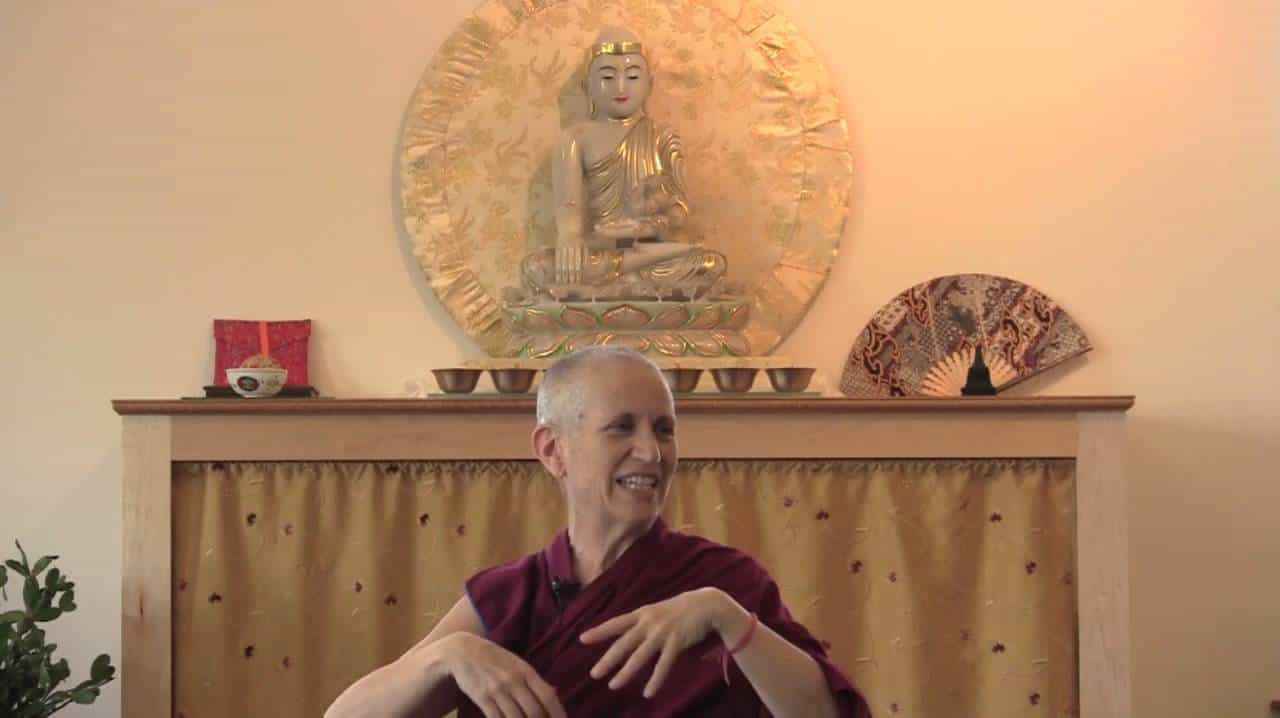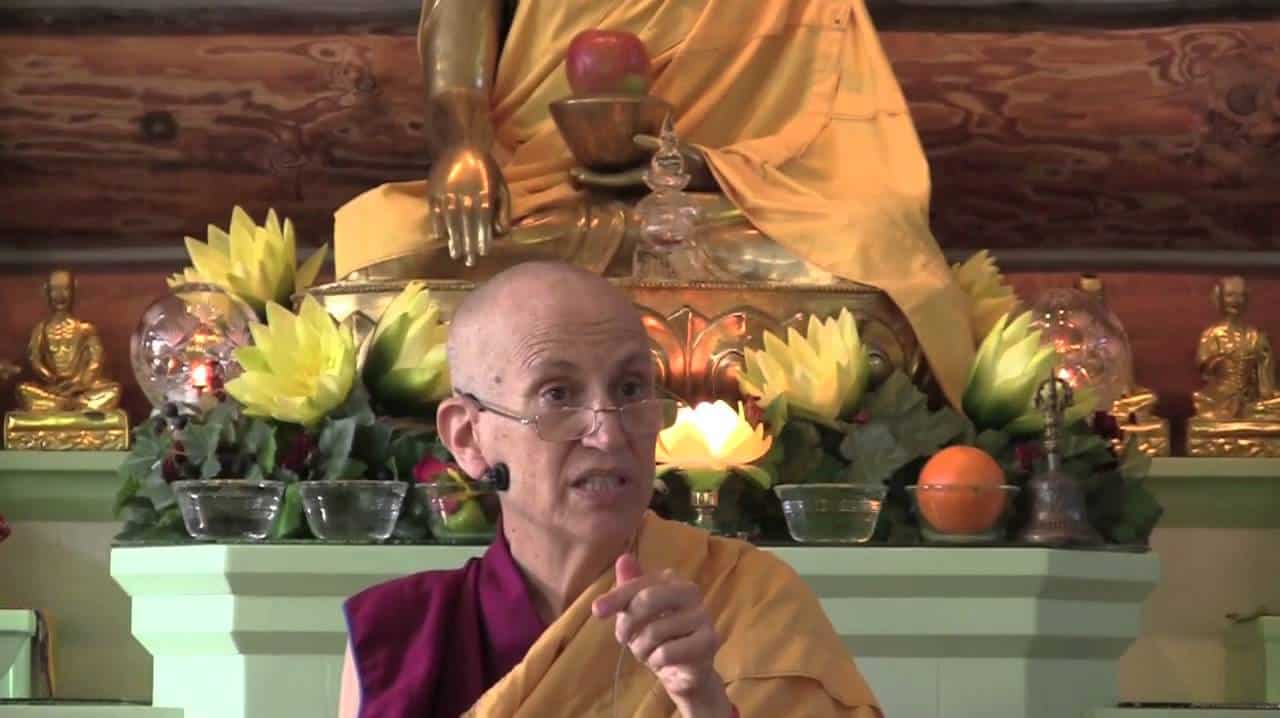Verse 6: The mischievous slanderer, jealousy
Verse 6: The mischievous slanderer, jealousy
Part of a series of talks on Gems of Wisdom, a poem by the Seventh Dalai Lama.
- Jealousy is an affliction that is unable to bear others’ good fortune
- When we are jealous we create rifts between us and those who are trying to benefit us.
- Rejoicing in others’ good qualities is an antidote to jealousy
Gems of Wisdom: Verse 6 (download)
“Who is the mischievous slanderer causing one to part from close friends?”
Audience: Jealousy.
Venerable Thubten Chodron: “Painful jealousy that is unable to bear the joy or success of others.”
Who is the mischievous slanderer causing one to part from close friends?
Painful jealousy that is unable to bear the joy or success of others.
It’s true, isn’t it? When we get jealous of somebody our mind is in incredible pain. Unbearable pain. It’s funny, isn’t it? Looking at somebody else being happy, or creating virtue, or having a good opportunity makes us experience pain. Isn’t that interesting? You can really see, jealousy is so perverted in that way. Usually we see happiness, we feel happy. Jealousy, we see happiness, good fortune… “Grrr.” You know? We’re tense. And people get out of control, totally out of control with jealousy, don’t they? Say things—do things—that they’d never do in their right state of mind simply because they can’t tolerate the other person’s happiness. Not only can they not tolerate it, they want to destroy it. As if destroying the other person’s happiness would give that happiness to us. Destroying somebody else’s reputation—which caused them to have some good situation—would make us have a good reputation and have a good situation. Actually, it does the exact opposite, doesn’t it? When we destroy other people’s happiness, other people respect us less. We have a worse reputation. Jealousy is just so upside-down in terms of how it thinks and what it motivates within us. Can you see that from your own experience? I mean, it’s miserable.
People get jealous over boyfriends and girlfriends, but they also get jealous if somebody else has more stature or status at work. Or they get jealous if it seems like the Dharma teacher is paying more attention to somebody else than to them. Or they get jealous if somebody else is more attractive than they are. Or if somebody else creates more virtue than they do. Or has the chance to go to His Holiness’s teachings and they don’t. I mean, who knows what? We can get jealous over anything. And it’s a really good way to make ourselves miserable. So when you wake up in the morning and you want to feel miserable, get jealous. It’s a good way to do it.
Here it also talks about how jealousy: “The mischievous slanderer causing one to part from close friends.”
If we look—and especially if we’re jealous of close friends, or we’re jealous of people who can actually benefit us—then we create wedges in the relationship and we part from them. Because we begin to see that person who was a friend, or a teacher, or a relative, or a mentor, or a coach, or whoever it was, we start competing with them, seeing them as better, getting jealous, not being able to bear it, and then doing something that fractures the relationship of the person who was actually benefiting us, who was a close friend, who was helping us.
Jealousy is totally unproductive and it can manifest in many, many ways in our lives. In your meditation, it’s very good to really think about things and look in your life and see in the variety of different ways in which jealousy has come in your life, and how you’ve acted under the influence of jealousy and what the result has been. Again, just seeing the disadvantages of something is a very good antidote to help us not follow it when it arises.
Another antidote for jealousy, of course, is doing the opposite of what you feel like doing when you’re jealous, which is to rejoice at the other person’s virtue or good qualities, or opportunity, or whatever it is, and say, “How wonderful that is, I’m really glad they’re able to do it.”
I remember many years ago—because as monastics we all sit in ordination order—and so you look up the line and like…. Jealousy comes in two ways. One is, “Oh, they’re so much better than me, you know, I can’t stand it.” Or, “They’re not as good as me, but they get to sit in front of me! That’s not fair! I should be able to sit in front. I’m a better practitioner than they are.” Or, “I’ve been practicing Dharma longer than they have, I shouldn’t have to sit back here. I should be able to sit up there!” Then you look down the line and it’s like, somebody who’s ordained after you or who’s younger? “Ahhh, They know Tibetan. They’ve done this retreat. They can teach this and that. They’ve done blah blah blah.” Can’t bear that either. So you sit there, you look up, you look down. “Ahhhh! [laughter] And the real problem is that we’re not accepting ourselves.
It’s quite a practice to learn to look up the line and look down the line and say, “I’m so glad these people have these abilities and these talents.” Whatever it is that we feel inferior about, to rejoice that other people can do it. Rejoice that they have that ability, that knowledge, that status, that popularity, that…whatever it is. And like, just think, “Well that’s good. It doesn’t matter than I don’t have it. Somebody has it. That’s really good.”
Also, they do say, “Be careful of who you’re jealous of because you may get what they have.” You usually think, “Oh, if I only had what that one has, if I only had what that one has, if I only had what that one has.” But then you get it and then you get all the problems that come with it. Don’t think that other people’s advantages are problem-free. Any time you have an advantage, you also get the problems that come with that advantage. First of all, other people are jealous of you, which is really uncomfortable. Second of all, you know you’re going to lose what you have someday. Third of all, other people are still better than you.
Everything will bring problems to an afflicted mental state. It’s true, isn’t it? As long as we’re in samsara, no matter what we have, our mind can make it into a problem. And you know, we may have all sorts of good conditions, but all we see are problems.
Venerable Thubten Chodron
Venerable Chodron emphasizes the practical application of Buddha’s teachings in our daily lives and is especially skilled at explaining them in ways easily understood and practiced by Westerners. She is well known for her warm, humorous, and lucid teachings. She was ordained as a Buddhist nun in 1977 by Kyabje Ling Rinpoche in Dharamsala, India, and in 1986 she received bhikshuni (full) ordination in Taiwan. Read her full bio.


